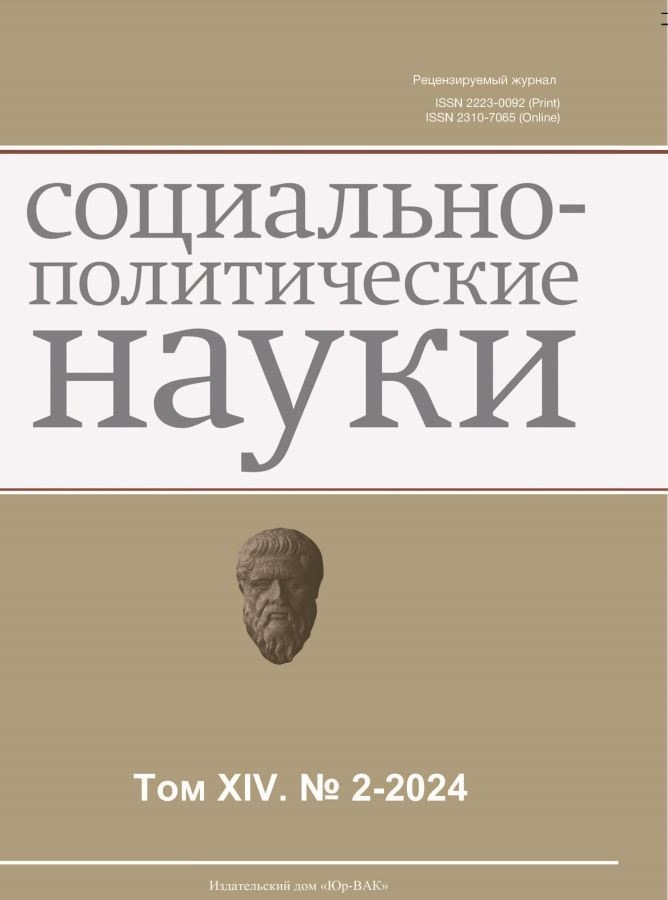The Decline of Information Resistance as a Prerequisite for the Practice of Political Manipulation
- Authors: Filippov A.R.1,2
-
Affiliations:
- Peoples’ Friendship University
- HSE University
- Issue: Vol 14, No 2 (2024)
- Pages: 38-44
- Section: Political Institutions, Processes and Technologies
- URL: https://journals.eco-vector.com/2223-0092/article/view/633825
- DOI: https://doi.org/10.33693/2223-0092-2024-14-2-38-44
- EDN: https://elibrary.ru/GNLXFJ
- ID: 633825
Cite item
Abstract
In this publication, based on the behavioral approach, conceptualization and discursive method, a study is carried out of the possibilities and characteristics of the influence of an objectively developing information array, distributed in accordance with modern communication trends, on the cognitive and emotional processes of the mentality of consumers of an information product in general and on the function of information resistance in particular. As a hypothesis, a statement is formulated according to which, in conditions of objective growth of generated information and the introduction of information (digital, network) addictions into the psyche, in combination with the inertia of perception inherent in the human brain, information resistance decreases, which increases the likelihood of the successful use of manipulative practices as a variation of suggestive communication. A definition of information resistance is given as resistance to the effects of unverified and/or unreliable information. The determinants of the vector of falling information resistance are revealed and studied, such as inertia of perception, pandemic dispersion of digital dependence, information overload. The validity of the correlation between the rate of decrease in information resistance and the effective dispersion of manipulations is substantiated. The leading varieties of modern manipulative practices, which are generated, among other things, by a decrease in information resistance, are characterized – the spread of deepfakes, the synthesis of cybersimulacra (including astroturfing and sockpuppeting), the imposition of behavioral patterns of reference groups, the cultivation and popularization of ersatz culture. Based on the results of the study, a position is formulated according to which a decrease in the level of information resistance, associated with a decline in the intellectual functions of human consciousness, activates primitive archaic forms of consciousness. It is noted that due to the reduction of cognitive methods of adaptation to the surrounding world to the simplest irrational forms, space opens up for the implementation of power relations through emotionally charged manipulations.
Full Text
About the authors
Anton R. Filippov
Peoples’ Friendship University; HSE University
Author for correspondence.
Email: anfilippov98@mail.ru
SPIN-code: 4519-9890
Postgraduate Student, Department of Comparative Political Science, Faculty of Humanities and Social Sciences; Master’s Degree in Law
Russian Federation, Moscow; MoscowReferences
- Lewis D. Stress Management: How to find an extra 10 hours a week. Moscow: Alpina Publisher, 2012. 238 p.
- Mandel B.R. Psychology of addictions (addictology). Moscow: INFRA-M, 2024. 334 p.
- Saveliev S.V. Cerebral sorting. Moscow: VEDI, 2016. 232 p.
- Starshenbaum G.V. Addictology: Psychology and psychotherapy of addictions. Moscow: Kogito Center, 2006. 367 p.
- Ukhtomsky A.A. Dominant. St. Petersburg: Piter, 2002. 448 p.
- Habermas Y. Theory of communicative activity. Vol. 1: Rationality of action and social rationalization; Vol. 2: On the criticism of the functionalist mind. Moscow: Whole World, 2022. 880 p.
- Pershin Y.Y. Archaic consciousness: Essence and principles: Dis. ... of Dr. Sci. (Philos.). Omsk: Omsk State Pedagogical University, 2014. 271 p.
- Watson J.B. Behaviorism. London: Kegan Paul, Trench, Trabner and Co., Ltd., 1945. 268 p.
- Baranov E.G. Information and psychological stability of personality: The essence and psychological content. Theoretical and Experimental Psychology. 2017. Vol. 10. No. 1. Pp. 58–64. (In Rus.)
- Zhukov A.V. The use of social networks as an information weapon. Search: Politics. Social Studies. Art. Sociology. Culture. 2020. No. 5 (82). Pp. 91–97. (In Rus.)
- Liter P.L. Technical decisions of arbitration from the point of view of legal protection. Legal Concept. 2020. Vol. 19. No. 4. Pp. 131–136. (In Rus.)
- Smirnov V.V. The phenomenon of digital dependence in the information society (socio-psychological aspect). Higher Education Today. 2019.No. 4. Pp. 72–76. (In Rus.)
- Filippov A.R., Novikov O.G. Theoretical approaches to the study of social harmony. Socio-political Sciences. 2023. Vol. 13. No. 5. Pp. 13–28. (In Rus.)
- Griffiths M. Behavioral addictions: a problem for everyone? Journal of Workplace Learning. 1996. No. 8 (3). Pp. 19–25.
- Raizach U. The responsibility of social networks in times of social and political manipulation. European Journal of Operational Research. 2021. No. 291. Pp. 906–917.
Supplementary files









